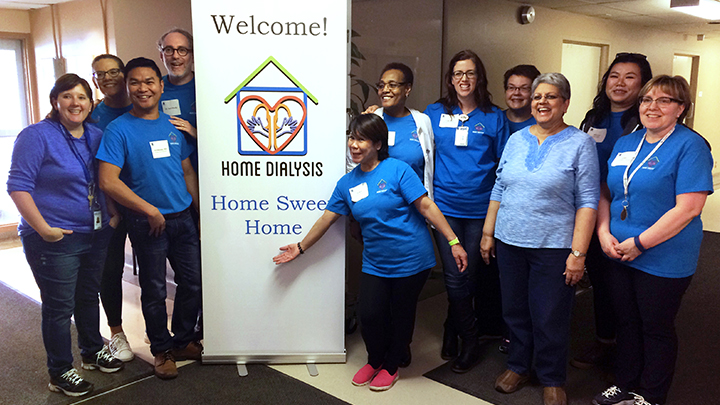

Home Sweet Home, an event held twice a year in Edmonton by the Northern Alberta Renal Program, promotes the benefits of home hemodialysis in a fun, speed-dating format in rooms set up just like home.
Story by Gregory Kennedy | Photo supplied
Members of the 800-strong Northern Alberta Renal Program (NARP) team take pride in being there for patients through the entire continuum of their kidney-care journey, often becoming an extended family to these individuals over the years.
To serve its overarching goal of improving the quality of life for patients and families living with kidney disease, NARP — the northern division of Alberta Kidney Care ¬— begins early with a proactive approach, striving to prevent kidney failure through education, early detection and management of high-risk individuals.
“It’s a wonderful opportunity for me because I’m able to make a positive impact on people’s lives,” says Tony Chacon, a patient care manager based in Edmonton.
“The reason I got into nursing was to help others. From an administrative point of view, there’s a fulfilment you get from seeing people go through the system — as you help them get what they need — while also helping staff deliver that care.”
Members of the renal program’s multidisciplinary team — which includes nephrologists, unit managers, registered nurses, nurse practitioners, licensed practical nurses, kinesiologists, occupational and physical therapists, social workers, dietitians, transplant coordinators and technicians — explore every avenue to delay the onset of dialysis in chronic kidney-disease patients.
But if the time comes, they ensure patients receive dialysis either in a clinical setting, or educate and empower them to do their own dialysis at home.
Dialysis is the process of cleansing the blood of toxins and excess fluid when normal kidney function is reduced. During dialysis, a patient’s blood is filtered through a dialyzer and then returned to the body.
NARP also ensures access to appropriate treatments and supportive care, up to and including its kidney-transplantation program, which in 2017 celebrated 50 years of renal transplants in Edmonton. (The first organ transplant in Alberta was a kidney transplant, performed at the University of Alberta Hospital on Jan. 15, 1967, by the late Dr. William Lakey. Since that time, close to 3,000 kidney transplants have been performed at the hospital.
Opportunities abound in diverse roles. Members of this healthcare team have been known to enjoy several careers and re-invent themselves as they wish, without ever leaving NARP, which oversees:
“There’s great opportunity within NARP to move between different areas under our umbrella,” says Tracy Schwartz, a patient care manager in Edmonton. “It provides huge opportunities to network and to grow professionally. There are many different facets of the program — it’s not just dialysis. We focus on providing patients with the knowledge to empowerment, to be a partner in their care.”
The program’s reach is as broad as its mandate, caring for patients from northern and central Alberta, northwestern Saskatchewan, northeastern B.C. and the N.W.T.
One of its most popular outreach events is Home Sweet Home, held each spring and fall in Edmonton, which contributes to the growing success of NARP’s home dialysis program.
A first-of-its-kind educational event, it allows current dialysis and pre-dialysis patients and their support person to explore this option — in a fun speed-dating format — at the Aberhart Centre’s home dialysis clinics, with staff and patient volunteers on hand to give demonstrations and field questions.
“Home Sweet Home is unique in the world,” says Schwartz. “It’s so effective. Patients move through rooms that are set up just like rooms in their home. So they meet the dietitian in the kitchen. In the bedroom, they meet a patient who’s doing home hemo. They get to engage not only with our staff, but with other patients who are on the therapy. They have lunch together. Meet our nurses and technicians. It empowers the patient.”
Home hemodialysis machines put patients in greater control of their own care. Rather than spending 12 hours or more a week receiving dialysis in clinics, therapy can be done at home where they’re more comfortable, often at night while they sleep.
Meanwhile, NARP staff also garnered a President’s Excellence Award nomination for their role in developing a provincial patient modality education pathway — a project that gives patients the information, skills and support they need to make decisions regarding their dialysis options.
Education champions from NARP and the Southern Alberta Renal Program (SARP) teamed up with patients and families to ensure the same high level of care and pathway is available across Alberta. As well, they created a patient education pathway and educational tools including videos, classes and materials.
For patients who rely upon peritoneal dialysis — in which dialysis fluid is introduced through a port into the abdomen’s peritoneal cavity to absorb wastes and is then removed — NARP and SARP have partnered with the Kidney Health Strategic Clinical Network on the START Project. Its goals are to promote the safe, effective use of this dialysis, start patients at the most opportune point in their lives and improve their outcomes while reducing costs to the healthcare system.
Peritoneal dialysis also Increases independence for patients as it can be performed at home.
Through all of the many aspects of kidney care delivered by NARP, a positive atmosphere prevails.
“We’re really big at celebrating events,” says Schwartz, “and we’re big at celebrating success.”